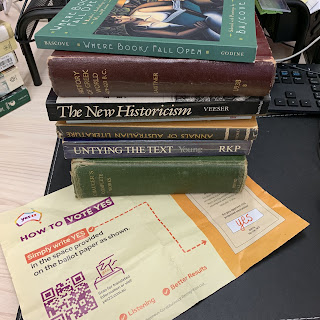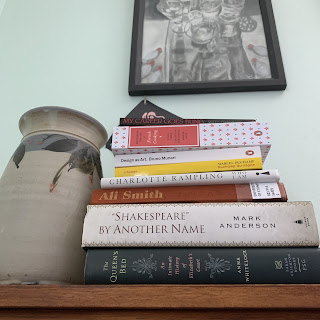On Reading Ali Smith’s AUTUMN (2016) II
In preparation for a masterclass led by Deidre Lynch on Ali Smith's Seasons quartet next month at the University of Sydney. These are initial responses to the text with a gesture towards fidelity to quotations prompted by my research into commonplace books and the use of prior text.
 |
| Random book assemblage and referendum ephemera |
Dear Void,
In yesterday's post (On Reading Ali Smith's Autumn (2016) I) I was thinking through my initial response to the very beginning of the text. And when I say very beginning, you'll see I didn't get past the first four short sentences before I was contemplating the nature of quotations and their distortions, and the way the integrity of a quote breaks apart through iterative use and reuse. I focused on the way the first dozen words of Dickens' A Tale of Two Cities have been prised away from the complete first sentence. The sentence uses a long set of oppositional clauses and then ends with a prescient observation on the way 'noisy authorities' will insist that stories from the past and of the past are not describing current conditions but that those past stories serve only as comparison to now; we we ought to understand that the past was vastly different, say authorities, vastly better, or vastly worse. Smith deftly uses Dickens' 'selvaged' quote to offer a new distortion, a quote stuck in a loop made from its own disrepair. ‘It was the worst of times, it was the worst of times’. Full stop.
Autumn is set in 2016, just after the June referendum, a
bitter and divisive fight that the British had with themselves around whether they
should remain as a member of the European Union or leave. Thus making a British Exit, Brexit. We don't talk enough about the way marketing practices make everything sound like tweeners are in charge. People get paid to come up with that mince. Speaking of mince.
One of Britain's 'noisiest authorities,' who had campaigned
for leaving the EU, Nigel Farage slipped into the Twitter scrolls of Australians
this week with his commentary on our democracy after our YES vote for
recognition of Aboriginal and Torres Strait Islander Peoples through a Voice to our parliament did not pass in a referendum. This is Australia's Brexit moment,
he said. The elites have been trounced, he said like the wrecking ball he is.
As of today, 1.8 million people have seen his text, perhaps read it. Fourteen
thousand liked it and 1590 commented, including me who in the silence of my own
house madly tweeted back for him to 'go away,' though my language was fruitier.
I was livid, I was tired. He won’t care. I’m just a member of the unwashed masses.
What a time, what an age, what an epoch, what a season we live in. Can we ever
think deeply enough upon what we read or consume as text, as it rolls past us
on the screen? Or are we doomed to accept pernicious twaddle from the likes of
Farage and repeat it to ourselves like a mantra until we accept it as inevitable?
We ought to say the lessons of history as told through the
stories we repeat to ourselves may not be lost if we can think those stories can
be told another way, with other possible endings. Better, more equitable, more
just, more open endings. Endings that don't necessarily guarantee 'the worst of
times' on closed repeat.
In Smith's Autumn, a strong image emerges of
eyes and a strong suggestion of the way we receive the world visually. Eyes
open, eyes closed, looking at the external world, then within. A representative collection of phrases includes the following: 'He shades his
eyes. Very bright' (4). 'Then it strikes him how unusually good his eyes are
today' (5). 'Then he looks down again with his new eyes' (6). 'The hair. It
has to be completely clear of your eyes. / It is completely clear of my eyes,
Elisabeth says. It's nowhere near my eyes' (23). 'She sees terrible despondency
in his eyes' (27). 'His eyes are closed and watery' (33). Her mother had her
hands over her own eyes at the kitchen table' (81).
In Autumn, there's an emphasis on the way we receive information from the world, the way we read, not just books but the way we read the world in a broad sense. The way associations are made, puns and similarities, the way words connect, the way things connect, the way we connect with all of it. Hearing one word will call to mind all available connections to that word in our personal bank of knowledge. For one character, the elderly Daniel Gluck the word 'scroll' calls to mind 'all the scrolls still rolled up, unread for two millennia, still waiting to be unfurled in the still-unexcavated library in Herculaneum' (36).
Those very scrolls are in the news this week. This week
seems to be calling back to Smith’s Autumn, with some sort of telepathy. It is
being reported that a young computer-scientist has managed to read the interior
of one of the carbonised scrolls by using machine-learning algorithm to discern
words and has identified the word 'purple'. I wish I could tell Daniel Gluck
all about it, or send him the link.
Jx
Read the fascinating story of the scrolls and the challenge to decipher them here.


Comments
Post a Comment